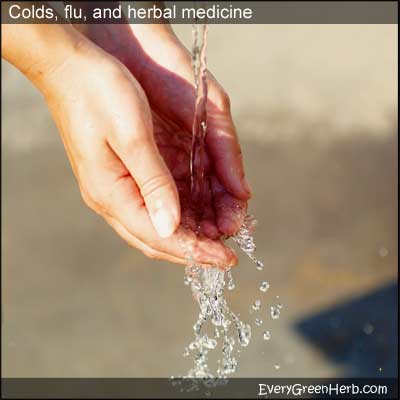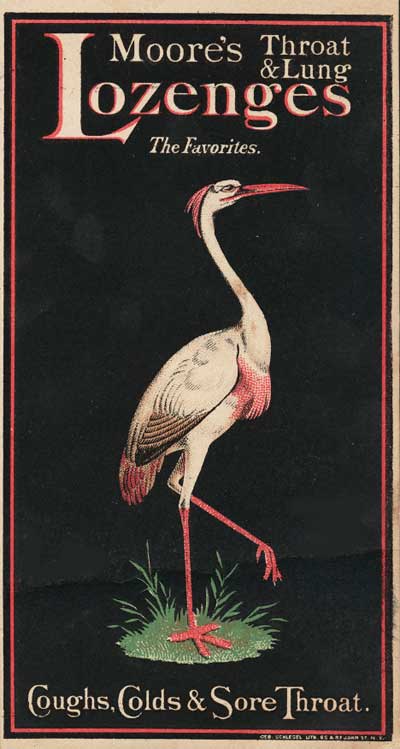Colds and flu herbs

Home remedies for cold and flu symptoms
If a cold or flu strikes, there are many herbal remedies to soothe irritated sinus membranes and hasten recovery.
An herbal bath can make you feel better. Add wintergreen or eucalyptus for congestion, mint or chamomile for headache, and tea tree essential oil for cough.
Massage is also good for treating colds and flu.
Mix three drops eucalyptus essential oil, three drops tea tree essential oil, two drops thyme essential oil, two drops sandalwood essential oil, and two drops of chamomile essential oil with a quarter cup of almond oil as carrier.
You can use one or all of these essential oils in massage, depending on what you have available. Rub on chest and back with gentle pressure. The touch of loving hands can do wonders!
When you have a cold or the flu, don't forget to drink lots of liquids and herbal teas. Also, stay at home and get plenty of sleep.
Common symptoms
Stuffy noses, fever, body aches, sneezing, congestion, and other cold symptoms can be successfully treated with medicinal herbs and essential oils.
Runny nose and stuffy sinuses are the most common symptoms of a cold. See home remedies for sinus problems for more information.
Coughing is also a common symptom of a cold. Read more about home remedies for coughs if your lungs are congested.

Prevention after exposure
When you are exposed to a cold or flu virus, try this prevention method:
- Mix a teaspoon of sea salt or table salt with a cup of hot water.
- Stir to dissolve.
- When lukewarm, snort up the nose and allow liquid to drain down the back of the throat and then spit it out of the mouth.
If you have some powdered myrrh, add a pinch to the mixture before snorting. Myrrh may not completely dissolve and the mixture may need to be strained through a couple layers of cheesecloth before snorting.
This all sounds awful but really works to ward off colds. I think it is better to gag for a few seconds than to suffer weeks with the flu!
Protect yourself by building immunity.
Before the start of cold and flu season, take regular doses of immunity building herbs like ginseng, goldenseal, yellowroot, licorice, and astragalus. A strong immunity is the best way to protect against sinus infection.
At the first sign of a cold, such as run down feeling with tickle in the throat or sneezing, begin taking three doses of astragalus a day for a week (but don't take astragalus with a fever). Often this one safeguard can stop a cold virus before it gets a chance to invade sinus tissues and the lungs.
Learn more about the healing and protective properties of astragalus.
Ways to build immunity include eating a good diet with live enzymes, drinking plenty of fresh water, breathing clean air, getting a good night's sleep, and living in as pure environment.
Avoid toxic chemicals poisons like pesticides, herbicides, cigarette smoke, engine fumes, radon, household chemicals, and air pollution.
The best way to fight the flu is to start building immunity in spring and summer! Don't wait until coughing, sneezing, sinus problems, and body aches get you down.

Reduce stress
Reduce stress and anxiety so that your body can fight off cold and flu viruses.
Try massage therapy, aromatherapy, and other alternative medicines that relax the body and mind.
Other ways to reduce stress including getting eight hours of sleep, drinking herbal teas, and doing deep-breathing exercises. Remember that laughter is the best medicine. Laughing actually builds up the immune system by decreasing cortisol production.
Keep a sense of humor by laughing out loud every chance you get! Your body, mind, and spirit will thank you.
Start building immunity by taking herbs before sickness strikes.
Another way to build immunity in preparation for the “flu season” is to get on a schedule of taking herbal supplements.
Yellowroot, ginseng, echinacea, rosemary, licorice, astragalus, burdock, milk thistle seed, white willow, elder flowers, catnip, yarrow, boneset, hawthorn, garlic, dandelion, and mushrooms are good herbs to build immunity.
One method is to start in May taking astragalus every day for two weeks. Then switch to either yellowroot or ginseng everyday for two weeks. Then skip a week or try a new herb for a day or two. Then start over with the two weeks of astragalus.
Do this on a regular basis all year long although astragalus should never be taken during a feverish condition! If sickness takes hold, start treating the symptoms so patient can rest comfortably.

Other prevention measures
- When shopping or in a crowded area, wear a mask that fits your face.
- Breath through your nose as much as possible.
- Wash your hands often for at least thirty seconds with soap and water or use sanitizer, especially after touching door handles, gas pumps, ATM buttons, and money.
- Keep your hands away from your face. You do not want to transfer germs from your hands to your nose, eyes, or mouth where they can easily enter your body.
- A hug is OK, but avoid kissing.
- Do not stand too close while talking with other people. Stay six feet away if possible, more if not wearing masks.
- When outdoors, stay upwind of other people if possible.
- Make the switch from shaking hands to doing fist bumps.
- Avoid close contact with people who are sick.
- Don't share drinks, food, or eating utensils.
- When not wearing a mask, cover your nose and mouth with a tissue when coughing or sneezing. Dispose of the tissue in a trash can and wash your hands.
- Dry your hands with a disposable towel. Use the towel to turn off the faucet, and then discard the towel into a trash can.
- Stay home if you are sick.
- Take off your shoes at the door when entering your home.
These preventive measures are very effective. Use common sense and you will be safe from harmful viruses.
Mask controversy
Wearing a mask somehow became political. We need to get out of that frame of mind.
Masks are not foolproof, but they do keep a lot of germs from spreading. When a person has a mask on correctly, their germs are not being spewed out into the air for others to inhale. If you don't believe it, try spitting with a mask on. The cloth catches it! A mask will keep most larger globules trapped, keeping other people safe.
Wearing a mask protects others! Always wear a mask in public if you have to go out with a contagious virus!

Cold and flu germs are contagious.
Colds and the flu are very contagious. Germs spread through droplets in the air that we breath. They also land on things we touch, then spread when we rub our eyes or touch our nostrils.
If possible, stay at home if you are sick. Symptoms of a cold or flu virus include fever, headache, weakness, dry cough, sore throat, runny nose, sinus problems, muscle aches, nausea, vomiting, and diarrhea.
Bacterial pneumonia, ear infection, serious sinus infection, dehydration, and worsening of chronic medical conditions are some of the known complications.
Elderberry helps fight viral infections.
For the sniffles and other sinus problems, try sipping a cup of elderberry, yarrow, and peppermint tea. Add ginger root for congestion.
Echinacea, yellowroot, and myrrh are powerful natural antibiotics that can help avoid lung infection, but be sure to use in moderation.
Elderberries are known for protecting the lungs, clearing sinus problems, relieving fever, and soothing muscle aches. They grow abundantly in forested areas of the North Georgia Mountains and have been used for centuries as a tonic
Elderberries also make a delicious syrup. We use elderberry syrup in tea, lemonade, and ginger ale for flavor and the healthy benefits.
Read more about the healing properties of elderberry.
Sore throat and fever
Sore throat is a painful symptom of a cold. Echinacea, white willow bark, white oak bark, or yellowroot can be made into tea, cooled, and used as a soothing gargle or spray.
Mix in a few drops of tea tree essential oil or clove essential oil for added strength. Also try gargling with salt water. Salt really brings relief to a sore, scratchy throat.
Read about herbs that heal a sore throat.
Fever can also be relieved with white willow bark. Use in tea for best results.
A liquid diet is beneficial during the first day of a cold or flu. Include green drinks, vegetable and fruit juices, and lots of pure water in the diet. Only light meals throughout the day should be given until condition is improved.
If you have been reading my Every Green Herb blog for a while, then you know we grow and sell a variety of herbs, but we also buy a lot, too. Try our favorite herbal suppliers for quality and value.
More home remedies for cold and flu symptoms
Complaints of the flu range from sore throat and earache to fatigue and nausea. Full blown cases of the flu require a visit to your healthcare professional. For less severe bouts of illness, there are lots of home remedies to treat allergy, cold, and flu symptoms.
- White willow bark tea helps fight feverish conditions.
- Ginger can help with nausea.
- Eucalyptus essential oil steam baths help relieve sore throat, runny nose, sinus problems, chest congestion, and cough.
- Hyssop can sooth the lungs.
- Mullein oil helps sooth earache and mullein leaf tea helps with respiratory problems.

Using essential oils to treat flu symptoms
Use essential oils to open the bronchial and nasal passageways. Eucalyptus and tea tree can work wonders on sinus congestion.
Try lavender essential oil for sinus headaches.
Try a soothing bath with a few drops of frankincense essential oil for body aches.
Refreshing peppermint can help bring down fevers. The list goes on and on.
Listen to your body.
The body will develop a taste for the herbs that it prefers and needs. Your body has lots to tell you if you will just listen.
If something stinks or makes you gag, do not take it. If you crave something, then by all means, take a little extra. It is hard to overdose on herbs in their original state. When taking over-the-counter products or prescription medications always take as directed. Do not take more than recommended and do not take extra doses.
Eat local honey.
Allergies, colds, and flu can be a nightmare. Get relief from runny nose, sinus congestion, and pollen by eating local honey.
A spoonful a day can help build immunity to allergens that cause runny nose and watering eyes. Make sure to purchase local honey as it is made from local flora.
There are several honey farms in the North Georgia area and many sell their wares at farmers markets, local festivals, and area stores. If you look, I am sure you can find some in your community.

Scientific studies and research
Years of research and clinical evidence shows that herbal medicine is effective at treating colds and flu.
Several herbal remedies have been found to be as good or better than over-the-counter products and even many prescription drugs. Studies done on licorice root, ginseng, echinacea, pomegranate, and guava found that properties in these herbs help in prevention and treatment of respiratory illness.
Since flu vaccines have to be updated annually, the available vaccines failing to offer protection from each distinct virus that spreads through a population. This drives scientists to find a more natural method of preventing colds and flu.
Most herbs contain properties that help fight viral infection. Polyphenols, flavonoids, saponins, glucosides, and alkaloids work to protect and fight virus.
Licorice is proven to help. Scientists have found that licorice contains glycyrrhizin which protects against flu. It works with the body's cells to prevent virus uptake. Read more about the healing properties of licorice.
Ginseng extracts have been proven to decrease duration, severity, and frequency of flu symptoms. Learn more about using ginseng in herbal medicine.
Other useful herbs include garlic, elderberry, cranberry, cinnamon, and echinacea.
Oral supplements can also help fight colds and flu. Vitamin C, zinc, selenium, seaweed extract, and probiotics can help.
An alkaline diet helps fight colds and flu.
Viruses become weak and immunity functions better in a slightly alkaline environment.
Eat more vegetables and fruits, and reduce meat, fish, eggs, dairy, and grains. Diet really does make a difference.
Try grounding
Grounding is also a way to fight colds and flu by reducing inflammation and building immunity. Before illness gets you down, walk barefoot when outdoors in a park or rural environment. Get back in touch with the earth. When living organisms are reconnected to the earth, harmful free radicals are neutralized.
More about immunity
I can't stress it enough! The best defense against infection is a healthy immune system.
When you hear about building immunity or making the immune system stronger, it not the same as building muscles or bones. The purpose of "building immunity" is to reduce inflammation and keep toxins out of the body so that the immune system is available to concentrate on invaders!
If the immune system is worn out from fighting inflammation caused by poor diet or toxic lifestyle, then it is not available to fight cold and flu germs when they invade the body. Unattended germs quickly multiply when your white blood cells are off fighting inflammation caused by unhealthy eating habits and lack of exercise. They take hold and make you sick!
To build immunity and reduce inflammation, avoid all processed foods, fried foods, and sugars. Don't take antibiotics or steroids unless absolutely necessary. Avoid pesticides and herbicides. Don't smoke tobacco or abuse alcoholic beverages. Exercise frequently. Eat a diet with plenty of fresh fruit and vegetables which contain the nutrients you need. Drink lots of pure water to stay hydrated.
If you keep your stress levels low and immunity strong, colds and flu will not get you down!
*Sore throat may indicate a serious condition. See your healthcare professional if sore throat pain lasts for more than two days. If you have a fever of 101 degrees or higher, difficulty swallowing, swollen glands in your neck, white patches on your tonsils, or reddish, sandpaper like rash on your body seek professional help.
Echinacea, cloves, and other herbs can make the throat feel numb. This is not dangerous unless breathing becomes difficult. If so, call 911 or seek emergency care.
Immunity building herbs should be rotated. None are recommended for constant long term use. Always consult with a healthcare professional before taking any herbal remedy especially if you are on prescription medications, pregnant, or nursing.
Sources:
https://www.ncbi.nlm.nih.gov/pmc/articles/PMC5871211/
https://pubmed.ncbi.nlm.nih.gov/33167671/
Blessings to you and yours!
Thanks so much for reading my blog. Jan.

*Note - the information on this website has not been evaluated by the Food and Drug Administration.
© 2005-2024 website design and content by Janice Boling